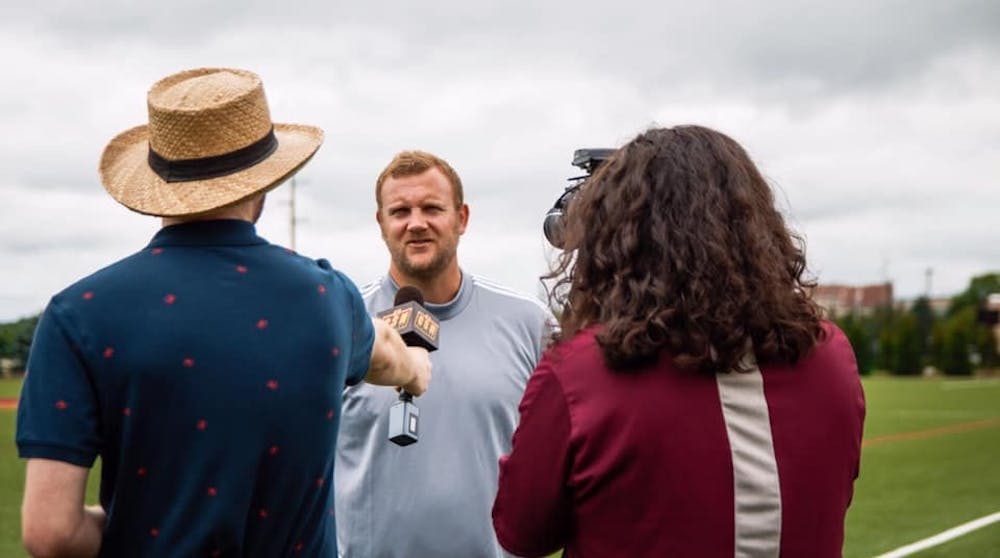Student employees grapple with shift cancellations, unknown future at work

When Mathieu Mondro learned Central Michigan University was suspending face-to-face classes and encouraging students not to return to campus after spring break, his initial concern had nothing to do with school.
He was more concerned about losing his on-campus job at Fresh Food Company.
Mondro, a junior from Canton, relies on his 20 hours per week to pay for apartment utilities, groceries, gas and, of course, his education. Despite coronavirus concerns, Mondro was hoping for as many shifts as possible.
The university employs approximately 3,200 student employees, manager of Student Employment Services Amy Thering said, but the amount of them that returned after spring break to work is unknown.
On March 19, CMU President Bob Davies' announced that online-only classes would continue for the remainder of the semester. The university also announced May commencement is postponed. The university encouraged students who prefer to stay at home to begin making arrangements to move out of campus housing.
Fresh Food Company, located in east campus, is the only residential restaurant open to serve take-out meals for students with a meal plan. Residence halls will remain open for students who need to live on campus until May.
Mondro received an email from campus dining explaining that his service wouldn't be needed until further notice.
"In accordance with CMU keeping campus closed through April 6, all student employees are not required, nor will be scheduled for any shifts during this time frame," the email stated. "We are working with CMU on closure dates and directives. If this time frame changes, you will be notified about returning to work from your location manager."
Only student workers were sent the email. Mondro is under the impression only full-time employees are working at the restaurant.
"I don't have anything scheduled," Mondro said. "I thought I'd need to work. Sure enough, Fresh started to pull all my shifts."
Student employees will not be compensated for time not worked due to the situation created by COVID-19. They are also not required to continue to work at any campus jobs, as long as their supervisor is notified.
Finding work in his hometown, due to the continued increase of coronavirus cases in Michigan, will be a challenge for Mondro as restaurants, bars and other service businesses feel the negative economic impact of the state-wide business shutdown. He's left wondering how he will provide for himself.
"This job was really important to me," Mondro said. "It was my only source of income during the school year. Now I have to tap into my savings from my summer job."
After the Mid-American Conference announced March 12 its decision to cancel all remaining winter and spring athletic competitions, Nick Vuylsteke knew he would be out of a job for the rest of the semester.
Vuylsteke has been employed as a student by CMU Athletics for about two years. He is learning to improve his writing skills, time management and gaining experience within a Division I athletic department. The decision made by MAC commissioner Jon Steinbrecher leaves Vuylsteke, a journalism major, out of a job and a chance to continue to build his skills.
Working an average of 20 hours per week at minimum wage, Vuylsteke was informed March 13 by athletic communications representative Andy Sneddon that he was no longer needed.
"It was a shocker to see sports were canceled," Vuylsteke said. "Maybe (at first) it was a bit of an overreaction, but I don't have an issue with it. I think it was the correct decision."
Before the coronavirus outbreak terminated CMU sports for the rest of the academic year, Vuylsteke had plans to cover track and field indoor championships, football pro day, lacrosse and other events.
Missing out on those opportunities does more than just hurt his portfolio. As a senior, his time working with CMU Athletics as a student is done. There is no "next year" for him. Vuylsteke is going home to Sterling Heights and plans to work at Jet's Pizza.
"I'm in a fortunate situation that they were willing to accept me on quick notice," Vuylsteke said. "If (Jet's) didn't hire me back, it would be scary. I don't have anything lined up past CMU Athletics in sports. If I didn't have a job in May, it would become an issue."
Working with the athletic department was a life-changing experience. Vuylsteke found his passion for public relations within college sports and doesn't think he would have received the same exposure at a different university.
"I met some great people along the way," Vuylsteke said. "I learned a different style of writing. I'm very appreciative."

Macomb sophomore Maddie Thomas poses for a photo on Feb. 4 in the Down Under Food Court.
Where Mondro and Vuylsteke have been given information on their status from employers, others have been left without answers.
Maddie Thomas was at her sister's choir concert when she noticed other universities in Michigan were shutting down in-person classes and asking students to remain at their permanent residences.
She knew it was only a matter of time before CMU did the same.
Thomas works for Classic Fare Catering, the catering service on campus. The Macomb sophomore works in the retail office, handling orders, communicating with the sales team and remaining in constant communication with kitchen staff.
"I really like my job, and I like being paid," Thomas said. "It's nice to have money when you're a college kid. It's scary to be in the dark, hoping something gets better."
Her shifts are canceled.Thomas's employers told her not to contact them with coronavirus questions.
"They haven't given me any information," Thomas said. "They told all catering students not to reach out at all. When things happen, they will contact us. I'm just floating."
Taking out loans for this academic year, Thomas was hoping she wouldn't have to do the same upon moving off campus as a junior beginning in the fall. Averaging 15 hours per week, she was counting on being in Mount Pleasant for the last two months of school to supplement her summer rent, giving her the ability to use prior savings for academics.
Now, she might have to take out an additional student loan for next semester to pay for school, rent, food and other expenses. The lack of communication with her employer has caused nervousness.
"I hope they come up with some plan to give students the money they were expecting," Thomas said. "There are so many people that rely on their jobs to pay rent each month, and they don't know how to get by without it.






